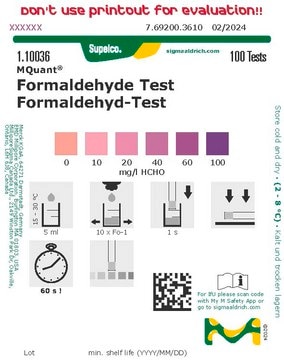This product does not contain 2,4-Dinitrophenylhydrazine (2,4 DNPH). (2,4 DNPH) was used as a derivatizing agent for QC analysis.
ICS045
Formaldehyde Standard
certified reference material
About This Item
Recommended Products
grade
certified reference material
Quality Level
CofA
current certificate can be downloaded
manufacturer/tradename
RTC ICS-045-100
concentration
1000 μg/mL in H2O
technique(s)
ion chromatography: suitable
application(s)
environmental
food and beverages
format
single component solution
storage temp.
2-30°C
General description
Application
- Commercial formaldehyde standard for mass calibration in mass spectrometry.: This study evaluates the use of a commercial formaldehyde standard in mass spectrometry for precise mass calibration, emphasizing its role in enhancing measurement accuracy in pharmaceutical research and biochemistry labs (Lyczko et al., 2015).
- Honey as a substitute for formalin: This research investigates honey as a potential substitute for formaldehyde in biochemistry applications, comparing its effects on tissue preservation and staining qualities, which may influence biochemistry assays and lab practices (Ozkan et al., 2012).
Other Notes
Signal Word
Danger
Hazard Statements
Precautionary Statements
Hazard Classifications
Carc. 1B
Storage Class Code
6.1D - Non-combustible acute toxic Cat.3 / toxic hazardous materials or hazardous materials causing chronic effects
WGK
WGK 3
Flash Point(F)
Not applicable
Flash Point(C)
Not applicable
Choose from one of the most recent versions:
Certificates of Analysis (COA)
It looks like we've run into a problem, but you can still download Certificates of Analysis from our Documents section.
If you need assistance, please contact Customer Support.
Already Own This Product?
Find documentation for the products that you have recently purchased in the Document Library.
Customers Also Viewed
-
Does this product already contain 2,4-DNPH or has 2,4-DNPH only been added to the product for CoA testing?
1 answer-
Helpful?
-
-
Why there are 2,4-DNPH and Formaldehyde-2,4-DNPH on HPLC result in CoA? Why there is no Formaldehyde on the result of HPLC.
1 answer-
Formaldehyde cannot be detected by HPLC without derivatization. Therefore, the formaldehyde-DNPH is the derivatized material and is what is being analyzed and reported. The 2,4-DNPH is the excess derivatizing agent.
Helpful?
-
-
Does Product ICS045 contain methanol as a stabilizer?
1 answer-
This product does have methanol in it
Helpful?
-
-
The CoA for the lot purchased lists the raw material potency as 35.2%, what is the purpose of this value? If I want to make a calibration curve using this, do I need to take this number into account? Or am I just using the 1000 mg/L for calculations?
1 answer-
Raw material purity is included for traceability to the raw material. In some cases, it can also explain any low-level impurities that a customer might see in the provided chromatogram. Please use the certified value directly. No correction of the certified value is needed. It has already been corrected for the raw material purity.
Helpful?
-
-
hola, con respecto al producto ICS045, me gustaría saber que concentración tiene de formaldehído, puesto que en la información del producto pone 1000ug/ml y en el certificado de origen de ejemplo que se puede descargar, pone 1000mg/l.
1 answer-
As listed in the properties section on the website, the concentration is 1000 μg/mL in H2O. The 1000 μg/mL may be converted to 1 mg/mL. Thus, the 1000mg/L reported in the Certificate is also correct.
Helpful?
-
Active Filters
Our team of scientists has experience in all areas of research including Life Science, Material Science, Chemical Synthesis, Chromatography, Analytical and many others.
Contact Technical Service







